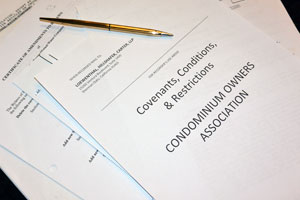LHC Newsletter Vol. 7, No. 1
“BOARD MEMBER’S CONFLICT OF INTEREST – WHEN DOES A BOARD MEMBER CROSS A LINE?”
By: David A. Loewenthal, Esq.
A growing concern within Associations is the issue of potential Board conflicts. Several issues must be evaluated including the board members volunteer status; board members personal or financial interest in a contract; receipt of gifts from vendors and litigation involving a board member against their association.
The volunteer status of a board member is essential to this discussion. Pursuant to Civil Code §1365.7 and Corporations Code §7231.5(a) there is no monetary liability on the part of, and no cause of action for damages shall arise against a voluntary director or voluntary executive officer of a non- profit corporation based upon alleged failure to discharge their duties as a director or officer if the duties are performed in good faith; performed in a manner that the director or officer believes to be in the best interest of the corporation and performed with such care, including reasonable inquiry, as an ordinarily prudent person in a similar circumstance would use. Volunteer is defined as rendering of services without compensation and compensation means remuneration whether by way of salary, fee, or other consideration for services rendered. It should be noted that payment of per diem, mileage or other reimbursement expenses to a director or officer does not affect that person’s status as a volunteer. As long as volunteer board members conduct themselves in this manner, they may avoid any personal liability pursuant to the Business Judgment Rule.
However, these statutory protections fail when a director changes from a voluntary status to one wherein the board member receives compensation. Such compensation can occur in several forms including, but not limited to, receiving monetary or nonmonetary payments from a vendor who is performing or wishes to perform services on behalf of the association for compensation; a bribe from a third party to obtain favor from the volunteer board member in making decisions; or when the volunteer director has an interest in a company that the association is considering contracting with which would allow the board member to receive direct financial compensation.
Examples of non-monetary compensation include an association bidding vendor who provides services to a board member(s) below market cost; a vendor providing a board member with a vacation or other benefits.
Pursuant to Corporations Code §5233, a self dealing transaction is one wherein the corporation is a party and wherein one or more of its directors has a material financial interest. Such transactions are considered to be self dealing unless the corporation entered into the transaction for its own benefit; the transaction was fair and reasonable as to the corporation; prior to consummating the transaction the board authorized the transaction by a good faith vote of a majority of the directors without counting the vote of the interested director(s); that the remainder of the board had knowledge of the material facts concerning the transaction and the directors interest; prior to approving the transaction, the board in good faith determined after reasonable investigation that the corporation could not have obtained a more advantageous arrangement with reasonable efforts under the circumstances.
In order to avoid potential liability for board members and having the contract deemed voidable, the interested board member must: (1) disclose the potential conflict to the entire board; (2) recuse himself from both participating in the contract negotiation discussion and vote; (3) the rest of the board should ensure that the selection of the contract is pursuant to a fair and reasonable process.
Where a board member may be in a conflict of interest because of a potential of entering into a contract with an entity that the board member or his family has a financial interest or as a result of a concern that the topic is one that would otherwise be the basis for an executive session meeting wherein there is a substantial concern that the board member will breach the confidentiality of such executive session meeting, the board may wish to create an executive committee pursuant to Corporations Code §7212. This would allow the board of directors to delegate certain issues to this executive session committee and avoid having the conflicted board member participate. This is especially important where the board member(s) is in litigation with the association.
In addition, in those instances where a board member is in litigation with the association, the directors absolute right to inspect all of the records of the association pursuant to Corporations Code §8334 can be limited.
The Court in Tritek Telecom, Inc. v. Superior Court, stated that although corporate directors have an absolute right to inspect and copy all corporate books, records and documents (Corporations Code §1602), including documents protected by the attorney-client privilege, a corporate director
does not have the right to access documents covered by the attorney-client privilege that were generated in the defense of a suit for damages that the director filed against the corporation. Corporate directors owe a fiduciary duty of care to the corporation and its shareholders and must serve in good faith, in a manner such director believes to be in the best interest of the corporation and its shareholders. Although it is generally presumed that the directors of a corporation are acting in good faith, a court is required to defer to the business judgment only of disinterested directors. A director is independent when he is in a position to base his decision on the merits of the issue rather than being governed by extraneous considerations or influences. A court may limit a directors inspection rights because the directors loyalties are divided and documents obtained by a director in his or her capacity as a director could be used to advance the director’s personal interest in obtaining damages against the corporation.”
As such, directors are largely protected under both the Civil and Corporate Codes as long as those decisions are made pursuant to the Business Judgment Rule, the director performs such actions as a volunteer, i.e., without compensation, and does not have a conflict of interest with the association.
The Common Interest Development rewrite, which is effective Jan. 1, 2014, includes Civil Code §5350 that sets forth specific prohibited actions by directors and committee members and states as follows:
Civil Code §5350. Prohibited Actions by Directors & Committee Members.
(a) Notwithstanding any other law, and regardless of whether an association is incorporated or unincorporated, the provisions of Sections 7233 and 7234 of the Corporations Code shall apply to any contract or other transaction authorized, approved, or ratified by the board or a committee of the board.
(b) A director or member of a committee shall not vote on any of the following matters:
(1) Discipline of the director or committee member.
(2) An assessment against the director or committee member for damage to the common area or facilities.
(3) A request, by the director or committee member, for a payment plan for overdue assessments.
(4) A decision whether to foreclose on a lien on the separate interest of the director or committee member.
(5) Review of a proposed physical change to the separate interest of the director or committee member.
(6) A grant of exclusive use common area to the director or committee member.
(c) Nothing in this section limits any other provision of law or the governing documents that govern a decision in which a director may have an interest.
2013 by Loewenthal, Hillshafer & Carter, LLP. All rights reserved. Permission is granted to reproduce or transmit in any form any part of this newsletter as long as proper attribution to Loewenthal, Hillshafer & Carter, LLP is given. Due to the rapidly changing nature of the law, information contained in this publication may become outdated. As a result, lawyers and all others using this material must research original sources of authority.


